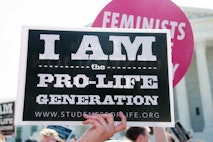
New study reveals impact of induced abortion on mental health
By Hector O. Chapa, M.D.

Colorado legislators approve bill funding Planned Parenthood
Update 8/26/25: On Sunday, the Colorado House passed a bill to allow state Medicaid funding for Planned Parenthood affiliates in the state. It had already passed in the Senate on Friday and will now head to the desk of Gov. Jared Polis.
Senate Bill 25B-002 was approved in a 43-19 party-line vote, with Democrats voting in favor of giving the taxpayer dollars to Planned Parenthood. It will require the Department of Health Care Policy and Financing to use state funds to reimburse Planned Parenthood through the state's Medicaid program and will cost the state an estimated $4.4 million during the current fiscal year, which began on July 1.
One woman, Lilly Boyd, spoke in favor of the bill, saying that she took the abortion pill from Planned Parenthood, but her follow-up appointment was canceled after the Big, Beautiful Bill was signed by President Trump. That bill included a provision to remove federal Medicaid funding from Planned Parenthood, but that provision has remained blocked. It is unclear why Planned Parenthood of the Rocky Mountains (PPRM) did not keep Boyd's appointment since federal Medicaid funding is still in place for Planned Parenthood.
Boyd said that being able to return to PPRM was "a matter of life and death," because she began hemorrhaging and had to go to the emergency room rather than PPRM. But abortion businesses like PPRM tell women to go to the ER if they experience abortion pill complications because abortion businesses are not trained or equipped to deal with those complications.
8/24/25: Despite facing a budget shortfall, Colorado legislators decided during a special session on July 25 to reject federal Medicaid funding in order to subsidize Planned Parenthood facilities in the state.
Earlier this summer, the Trump administration passed the “Big Beautiful Bill” reconciliation bill, which is currently blocked by order of an Obama-appointed judge.
Under the legislation, abortion businesses including Planned Parenthood cannot receive Medicaid reimbursements for one year.
Colorado legislators are meeting to examine how this will affect health care in the state and reportedly plan to reject federal Medicaid funding so the state can fund Planned Parenthood’s non-abortion services.
Colorado legislators convened for a special session to address a nearly $800 million deficit in the state budget and examine the impact of Medicaid cuts on healthcare for Coloradans. During the session, lawmakers also began forwarding a bill that would give state Medicaid funding to Planned Parenthood, the nation’s largest abortion chain.
SB 25B-2 requires the Department of Health Care Policy and Financing to use state funds to reimburse abortion businesses, like Planned Parenthood, which stand to lose federal Medicaid funding due to the “Big Beautiful Bill,” although the provision is currently blocked and Planned Parenthood continues to receive the funding.
This funding will allegedly go specifically towards non-abortion services provided by Planned Parenthood. The move was harshly criticized by Thomas Parille, a retired doctor and president of Democrats for Life of Colorado:
The governor has called a special session of the Colorado General Assembly to close an anticipated $700 million budget shortfall.
Normally, this would be a time to conserve state dollars. However, Colorado legislators plan to reject federal Medicaid dollars to subsidize non-abortion services for Planned Parenthood. These services could be delivered by FQHCs and other health care organizations with full federal participation.
Instead, Democrats are introducing legislation during the special session to replace Planned Parenthood funding lost because of the BBB using state dollars and to maintain Planned Parenthood’s capture of this Medicaid population.
This necessitates shifting Medicaid dollars from other vital health care priorities at a time when the Medicaid budget is already under immense pressure. This would be fiscal malpractice.
Jake Teter, VP of Government Affairs for Planned Parenthood of the Rocky Mountains, applauded the bill.
READ: ‘Stranger Things’ star Millie Bobby Brown and husband Jake Bongiovi adopt baby girl
“We can’t keep canceling people’s appointments and then trying to bring them back again,” Teter said. “It’s not sustainable and it’s not fair to our patients. This bill allows the state to cover the difference for the Medicaid reimbursements and ensures we don’t have to close our doors to those patients.”
Though Planned Parenthood markets itself as a legitimate health care provider, its actual health care services have decreased over the years while the number of abortions it commits has increased:
Cancer screenings overall: Down 79% since 2004
Breast cancer screenings: Down over 80% since 2000
Pap tests: Down 83% since 2004
Prenatal care: Down 80% since 2010
STI treatments: Down 19% since 2019
Meanwhile, abortions have increased by 100% since 2000.
Planned Parenthood also only serves an estimated two percent (2%) of American women of reproductive age; it is hardly a provider upon which women rely.
For people seeking real health care, Planned Parenthood is far outnumbered by Federally Qualified Health Centers (FQHCs) and other non-profit clinics. In 2023, for example, FQHCs had 15,000 location sites, compared to just 600 Planned Parenthood facilities the same year.
Unsurprisingly, FQHCs serve significantly more people, providing cancer screenings, prenatal care, and other actual health care services.

Defenders of Planned Parenthood argue that the taxpayer dollars given to the abortion chain do not violate the Hyde Amendment, which prohibits federal dollars from being spent on abortion. Yet that money is fungible, freeing up funding that would have paid for salaries, facility rent, and general overhead to go towards abortion instead.
And despite constant complaints of how cutting Medicaid reimbursement to Planned Parenthood would devastate women, Planned Parenthood is receiving record-high taxpayer dollars, all while also reporting the highest ever net assets and total liabilities.
Women deserve better than Planned Parenthood. If Colorado politicians want to ensure Coloradans have access to health care, they should focus on funding the 256 FQHCs in the state rather than the nation’s largest abortion chain.
Follow Live Action News on Facebook and Instagram for more pro-life news.

By Hector O. Chapa, M.D.

Pop Culture
By Elle Kay

Activism
By Nancy Flanders

International
By Bridget Sielicki

Issues
By Bridget Sielicki

Abortion Pill
By Bridget Sielicki

International
By Cassy Cooke

Newsbreak
By Cassy Cooke

Pop Culture
By Cassy Cooke

International
By Cassy Cooke

Abortion Pill
By Cassy Cooke